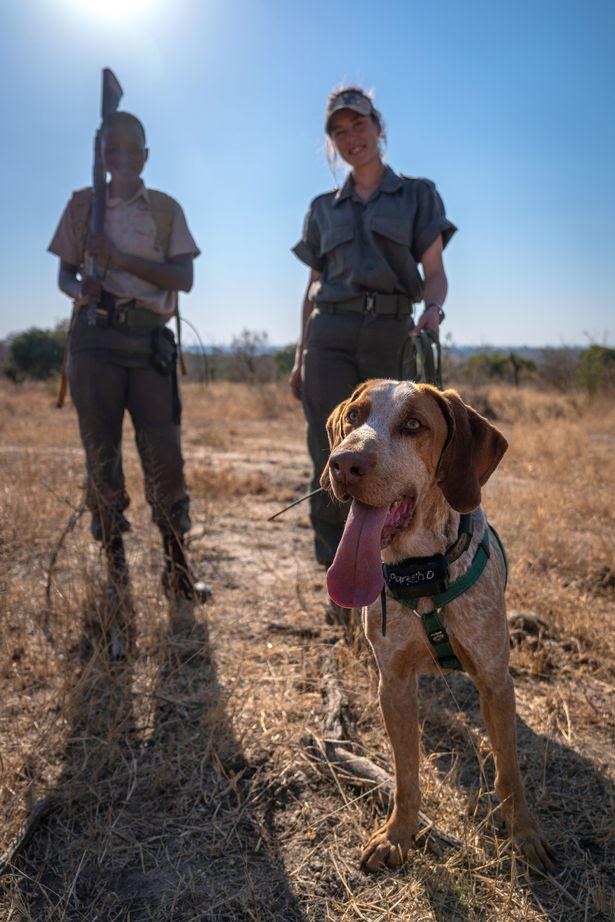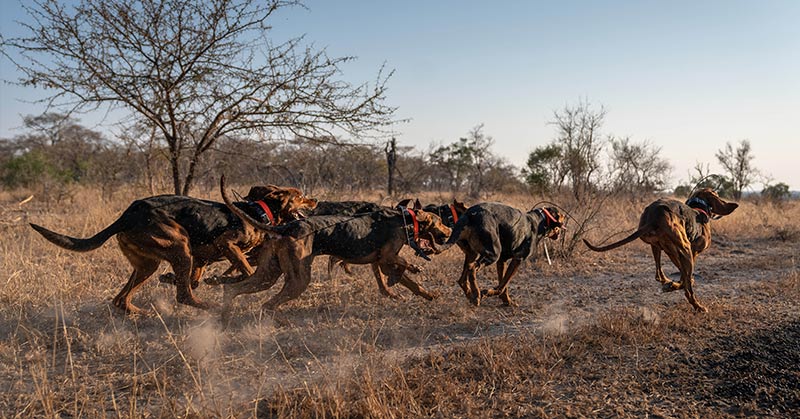Relentless poaching has remained one of the major concerns plaguing the conservation efforts of African wildlife [1]. Many formerly thriving species have faced declining populations in recent decades, and the situation just keeps getting worse. However, governments are becoming innovative with anti-poaching strategies, and it’s a gold star for the attack-dog initiative that has helped save dozens of South African rhinos.
Since 2018, a team of four dogs has helped South African law enforcement in the take down of over 150 poachers, confiscating 53 guns, and saving 45 rhinos [2]. The pack, consisting of a Texan Black-and-Tan Coonhound, Belgian Malinois, Foxhounds, and Blue Ticks have proven how effective man’s best friend is in the fight to protect and conserve endangered wildlife, a strategy that has resonated on a global scale.
According to reports, the dogs are part of an anti-poaching K9 fast response unit in northeastern South Africa. These special canines were brought in from Texas as puppies and trained as free-runners at the Southern African Wildlife College in Greater Kruger National Park.
Between Vietnam, China, and several other countries interested in traditional medicine, the black market for rhino horns is pretty competitive, and unfortunately, it’s booming. One rhino horn could fetch up to £200,000, and between 2008 and 2018, estimably 8,000 rhino horns have been smuggled out of SA into Asia for illegal trade [3]. About 4,000 of the host rhinos have been killed in Kruger Park, one of the longest-lasting strongholds for rhinos in Africa today. Protecting the species isn’t an easy task for South African authorities, and over 80% of the world’s remaining rhino population roam the country.
Read: Expert Warns Trophy Hunting Could Push Polar Bears To Extinction
Free-running dogs trained to rescue rhinos
The pack was captured in action by Cape Town-based photographer Sean Viljoen, 29. Viljoen owns and runs Conservation Film Company, a production start-up that documents front-line efforts aimed at the conservation of wildlife from around the world.
The dogs were trained by K9 instructor Johan van Straaten, who grew up being a dog whisperer in Karoo, South Africa. He trained the dogs from puppyhood until they were about 18 months old and ready to start their careers as poacher hunters.

“In the areas where the Southern African Wildlife College patrol, the success rate of the dogs is around 68 percent using both on and off-leash free tracking dogs, compared to between three to five percent with no canine capacity,” Straaten said. “The game-changer has been the free tracking dogs who are able to track at speeds much faster than a human can in terrain where the best human trackers would lose spoor. As such, the project is helping ensure the survival of southern Africa’s rich biodiversity and its wildlife including its rhino which has been severely impacted by wildlife crime.”
The entire strategy took roots following an agreement struck between the dogs’ owner, Joe Braman from Southern Texas, and Theresa Sowry, CEO of the Southern African Wildlife College. In 2017, Sowry visited the part-time cop/ businessman to learn more about the aggressive free-running pack she’d heard about. Since the dogs were said to be useful in helping Texan authorities track down escaped prisoners, they might also be able to track down poachers seeking to wipe out an entire species back home.
“Kruger was very keen to test free-running dogs,” Sowry said, to National Geographic [4]. “Building a pack dog team is a massive undertaking. You need the right genetics, the right training, and, most importantly, the right mindset to bring it all together.”
In Braman’s opinion, the most important trait to teach the pack was aggression. “It’s all about intimidation!” he says. “If a dog starts attacking you, the first thing you’re gonna do is throw the gun and climb a tree.” That leaves time “to get in and take a poacher into custody.”
Read: Trophy Hunter Seeks to Import Parts of Rare Rhino He Paid $400,000 to Kill
A significant impact so far
Alongside biting and barking suspects into surrender, the dogs were intensively trained on how to track with scents and maintain steady trails at incredible speeds.
The first time Kruger Park’s hounds chased down a group of poachers was truly remarkable – albeit hilarious for those who watched. A poacher had just killed a rhino and for the first time in all of their 18 months, the eager dogs were loaded up into a helicopter, fitted with GPS, and were ready to run. They didn’t know what they were up against, but they managed to get a decent job done against four poachers.
“The poachers were striking them with sticks!” Braman says. “In my mind, I’m still in Texas. And I’m thinkin’, I hope they bite ’em! But the dogs didn’t. They just surrounded them: bark bark bark! We arrived, and my dogs had a guy under a tree. And we took [the poachers] into custody. Everyone was in disbelief.”

The next day, they helped capture 3 poachers and 2 more on the next. Across multiple runs from then on, they’ve upped the poacher takedown rate from 5 percent to an astonishing 54 percent in 2 years. Thanks to these hounds who now have babies of their own, South Africa is much a safer place for the rhino species to thrive and repopulate. There’s still a lot to be done, but they’ve successfully made a break in a case that seemed unrelenting for so long.
While there may be gunfights and knife-stabbing flexes from the poachers when the dogs are in action, the team continues to prepare them for any violent scenarios.
“It’s a high-risk job for human and dog,” Van Staaten says. “But with training and with standard operating procedures, we try to minimize the risk.”

Keep Reading: Lions Found Mutilated By Poachers For ‘Magic Potions’
- https://news.mongabay.com/2020/03/poaching-and-the-problem-with-conservation-in-africa-commentary/
- https://www.independent.co.uk/voices/campaigns/elephant-campaign/meet-the-dogs-on-the-antipoaching-front-line-a8254166.html
- https://www.bbc.co.uk/newsround/52307028
- https://www.nationalgeographic.com/animals/2019/09/texan-hounds-fight-rhino-poaching/

